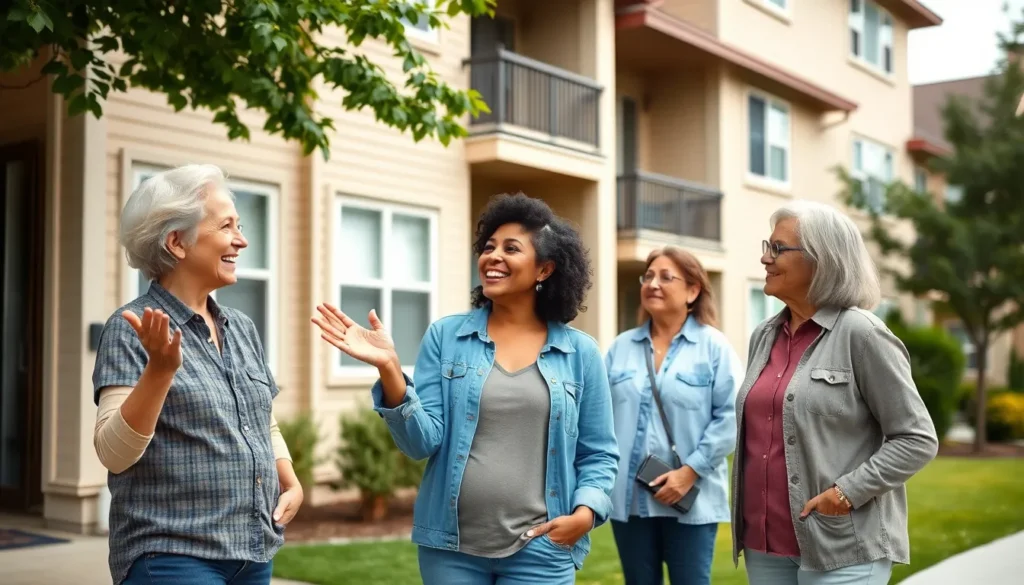Living in a condo can feel like a sitcom where the laughs are real but the complaints are louder. From the late-night karaoke sessions to the mysterious scent wafting through the halls, condo life often comes with its own set of quirky challenges. While sharing walls and amenities can foster a sense of community, it can also lead to some rather entertaining—and sometimes frustrating—neighborly disputes.
But fear not! Navigating neighbor complaints doesn’t have to be a battle royale. With the right approach, it’s possible to turn potential conflicts into opportunities for connection. Whether it’s finding a diplomatic way to address noise issues or dealing with the infamous “parking space hog,” this guide will help residents tackle those pesky complaints with a smile and maybe even a few laughs along the way. After all, a little humor can go a long way in making condo living a delightful experience.
Table of Contents
ToggleUnderstanding Neighbor Complaints in Condos
Neighbor complaints are common in condo living. Various issues often arise among residents, requiring effective resolution strategies.
Common Types of Complaints
Noise disturbances rank high among neighbor complaints. Loud music, late-night gatherings, and pets barking contribute to these frustrations. Additionally, shared amenities often become a source of disputes. Residents may argue over pool use, gym hours, or parking spaces. Other frequent complaints include inappropriate behavior, such as smoking in shared areas or leaving trash in communal spaces. Frequent communication can help mitigate these issues before they escalate.
Causes of Neighbor Disputes
Misunderstandings frequently lead to neighbor disputes. Differing lifestyles can create friction between residents. For instance, night owls and early risers may clash over noise levels. Expectations regarding shared spaces also cause tension; some residents may feel entitled to exclusive use of common areas. Furthermore, residents may misinterpret each other’s actions, fostering further resentment. Open dialogue serves as a crucial component in resolving these disputes effectively.
Addressing Neighbor Complaints

Addressing neighbor complaints involves open communication and proactive strategies. Residents can navigate conflicts more smoothly when they utilize effective approaches.
Effective Communication Strategies
Active listening forms a cornerstone of resolving disputes. Acknowledging concerns validates feelings, making neighbors feel heard. Sharing specific examples of issues fosters understanding. Clarity in the conversation prevents miscommunication. Scheduling a face-to-face meeting often enables a more personal connection. Keeping a calm demeanor helps defuse tension during discussions. Stating intentions to improve the situation encourages cooperation. Documenting conversations can also establish a record of interactions for future reference.
Using Mediation Services
Turning to mediation services can ease the resolution process. A neutral third party facilitates discussions between conflicting residents. This approach allows for each individual to express their views without interruption. Mediation sessions typically focus on finding common ground. It serves to clarify each party’s expectations and helps develop mutually beneficial solutions. Many condo associations offer access to these services as a resource for residents. Utilizing mediation can lead to outcomes that reinforce community relationships.
Legal Considerations for Condo Residents
Legal considerations play a vital role for condo residents dealing with neighbor complaints. Understanding the law ensures residents know their rights and responsibilities.
Understanding Your Rights
Condo residents possess specific rights that protect them against unreasonable disturbances. Tenants may enjoy the right to quiet enjoyment, which prohibits excessive noise or interference from neighbors. They should communicate their concerns directly and calmly with the offending party. Documentation of incidents can also support claims if further action is needed. Being informed about state and local laws regarding tenant rights enhances residents’ ability to address disputes effectively.
Relevant Condo Association Rules
Condo association rules govern behavior and establish expectations for all residents. These regulations often cover noise limits, pet policies, and use of shared spaces. Reviewing the association’s governing documents is essential for residents seeking clarity on acceptable behaviors. Violations of these rules can result in warnings or even fines. Engaging the condo board when issues arise promotes appropriate resolutions. Understanding these regulations fosters a sense of community and cooperation among residents.
Preventing Future Complaints
Creating an environment that minimizes complaints enhances condo living. Residents can take proactive steps to foster community spirit while addressing potential issues.
Building a Positive Community
Residents can build a positive community by engaging with neighbors. Participating in communal activities encourages interactions, which strengthens relationships. Regularly hosting social gatherings promotes conversation and understanding. A welcoming atmosphere sets the tone for friendly connections and fosters a collaborative spirit. Sharing newsletters or updates via community boards keeps everyone informed of events and issues. Encouraging residents to express themselves in forums nurtures a sense of belonging and investment, ultimately reducing complaints over time.
Setting Boundaries
Setting clear boundaries plays a crucial role in preventing conflicts. Establishing respectful communication norms helps clarify expectations among residents. Discussing noise levels and shared space use upfront can prevent misunderstandings. Creating a schedule for shared amenities, such as laundry or recreational areas, encourages fair access. Residents should outline personal space preferences and address any issues calmly when they arise. Documenting agreements can serve as a helpful reference point. Clear boundaries lead to enhanced respect and cooperation, significantly minimizing future complaints.
Navigating neighbor complaints in a condo can be tricky but it doesn’t have to be a negative experience. By approaching disputes with understanding and a willingness to communicate residents can foster a more harmonious living environment. Building connections through shared activities and open dialogue not only resolves issues but also strengthens community bonds.
Proactive strategies like setting clear boundaries and documenting agreements can significantly reduce future conflicts. Emphasizing respect and cooperation among neighbors creates a positive atmosphere where everyone can enjoy their home. Ultimately a little effort in communication and community engagement goes a long way in enhancing the condo living experience.









